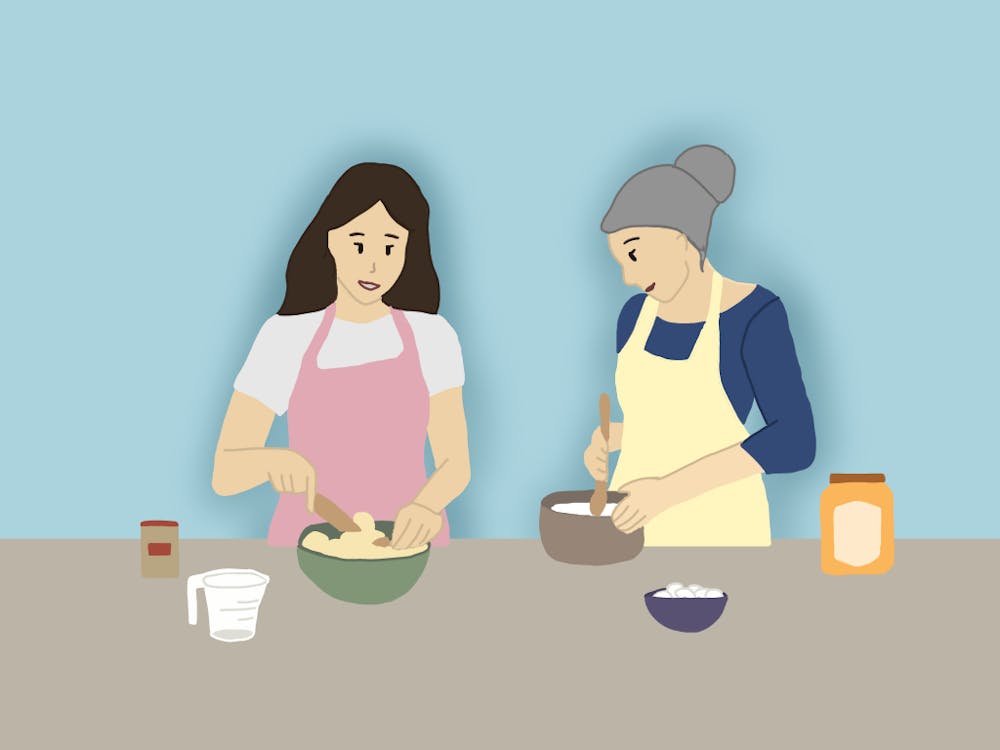The first time I was a hostess, my work attire included things like dress pants, ties and blazers. The restaurant’s atmosphere was formal and stuffy with an added air of pretentiousness — it was a rather upscale place. What bothered me most was simply the unspoken rule that I couldn’t be myself.
The entire hospitality industry is built on facades. This line of work is one instance where maintaining a facade is necessary and good. However, the extent to which I had to maintain this facade in certain places bothered me.
At my first job, proper conduct was enforced to the extent that I couldn’t even pop a mint into my mouth for fear that diners would catch me in the middle of eating while on the job. What I could say was more or less restricted to the lines I was trained to say in greeting. It all felt mechanical and unreal. If customer service was all about being empathetic and making the customer feel at home, shouldn’t I pursue the same for myself before helping others? It sounds rather cliché, but it is exactly how they teach you on flights — putting on your mask before helping others.
Other times, the job’s superficial aspect annoyed me most. I felt my purpose was to look pretty — as the first face most customers would see, mine had to be one that was a pleasure to look at.
Part of my job was to open doors for our customers. Once, while doing so, a group of men walking past the restaurant caught sight of me and called out, “Hey girl, you look beautiful!” Although certainly one of the nicer moments of my job, it became more apparent than ever that I really was meant to be a showpiece.
In another instance, a family with teenage children was about to leave, and I prepared to open the door for them. The son, who couldn’t have been more than 14 or 15 — the braces, acne and skinny body were a dead giveaway — laughed with a half-sneer and said, “What, your job is to open doors for people?”
My sassy answer would’ve been, “Well someone has to pay for my education!” But, of course, that didn’t occur to me until after that kid and his family had driven off.
I was left feeling a little shocked mostly because that was the first time I had been teased or verbally looked down upon for doing my job. I felt the clear hierarchy that existed at the restaurant, and it was evident I was at the very bottom of the food chain.
It may seem like I’m unleashing a lot of bitterness, but honestly, I did not realize the depth of this feeling until I started my second job in the food and beverage industry two years after I left my first one. The stark contrast between the two was painfully clear.
Fast-forward to my first day at the café. Miraculously — or perhaps not really — I felt like a fool from minute one. The front door to the café was locked, and I had no clue how else to get in. The door was usually the way to get in anyway, right?
I actually stood there for a good two minutes, trying to figure out whether or not I was stupid for thinking so. Eventually, I remembered that knocking would be a solution to my being locked out. The moment I did, the door swung open, and a young woman with dark curly hair tied up in two buns stood behind it.
Right away, I could tell this wasn’t going to be anything like my last job — everyone was in shorts, casual t-shirts and flip flops. In other words, everyone looked normal.
The entire vibe of the tiny café was offbeat and friendly. I did not feel the compulsion to constantly hold my breath and maintain a robotic composure with that fake smile pasted on my face. Vera, the woman with the curly hair in buns, talked me through my job as if she were catching up with a friend. The entire spiel was delivered in an offhand way, which threw me off initially, but I knew deep down that she was a no-nonsense person.
That said, she and the entire staff welcomed me right away and spent time giving me little tips whenever I felt overwhelmed. The overall liberal atmosphere of the café only added to my adjustment speed. I realized how quirky and different each member of the staff was and how natural they seemed in a professional setting. As a naturally shy person, this was definitely heartening to see because it encouraged me to break out of my shell and ask more questions, crack a few jokes and be myself.
Additionally, I felt like I had autonomy to move around the café without feeling as if I were a trespasser. Nothing was declared off limits simply because I was only the hostess and I had no business there. I was treated as a helping hand, expected to pick up the slack wherever it was necessary — I was not just confined to my role. As cheesy as it sounds, it really did feel like I was making a difference and that I was needed.
All of this made going to work a lot easier and little by little, I stopped thinking of work as a job and felt I didn’t have to keep interactions restricted to the ‘work me.’ I realize now more than ever how my perceptions of places really are made up by the people I surround myself with.
By finding the atmosphere and culture you fit in with, virtually any job can be enjoyable.







